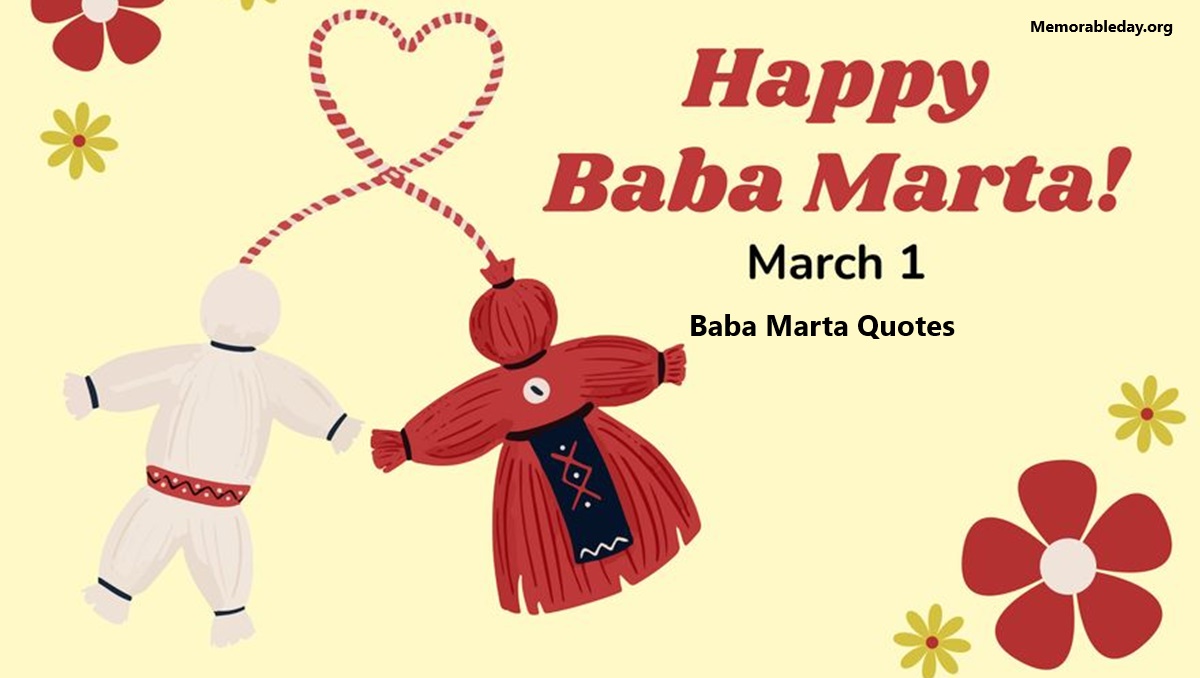
First of all, I will discuss Baba Marta Quotes, Wishes, Messages, and greetings! Baba Marta, a Bulgarian tradition celebrated on March 1st, is a unique cultural event that symbolizes the coming of spring, friendship, and good health. This vibrant festival involves wearing martenitsa, a traditional charm made of red and white threads, and engaging in various customs and rituals.
Every year March 1st celebrates Baba Marta. On this day allows us to have fun with our loved ones each year. So that, Wishes your Friend and family Baba Marta quotes, wishes, greetings and Messages to share.
History of Baba Marta
The exact origins of Baba Marta are shrouded in folklore and legends. One popular belief connects the tradition to the goddess Baba Marta, who is said to be responsible for the weather in March. According to the legend, Baba Marta’s mood determines the weather for the month, and wearing a martenitsa is believed to appease her and ensure a pleasant spring.
When is Baba Marta Celebrated
As mentioned earlier, Baba Marta is celebrated on March 1st each year. This date coincides with the beginning of spring in Bulgaria, marking the transition from winter to warmer weather.
How we Celebrate Baba Marta
The celebration of Baba Marta involves several customs and traditions. One of the most important is the wearing of martenitsa. Martenitsa are typically made of red and white thread, but they can also be adorned with beads, charms, or other decorative elements. It is customary to wear a martenitsa until you see a stork, which is considered a sign of spring’s arrival.
Another tradition associated with Baba Marta is the giving of martenitsa as gifts. This is a gesture of friendship, love, and good wishes. It is believed that receiving a martenitsa brings good luck and health throughout the year.
Why is Baba Marta Celebrated
Baba Marta is celebrated for several reasons. First, it is a way to welcome the coming of spring and celebrate the renewal of nature. Second, it is a tradition that promotes health and well-being. The martenitsa is believed to have healing properties and to protect the wearer from illness. Finally, Baba Marta is a celebration of love, friendship, and good wishes. The custom of giving martenitsa as gifts fosters strong bonds between people and creates a sense of community.
Baba Marta Quotes
- “Baba Marta is a day of hope and renewal.”
- “Let Baba Marta bring you joy and prosperity.”
- “Embrace the spirit of Baba Marta and start anew.”
- “May Baba Marta’s blessings fill your life with happiness.”
- “Wearing a martenitsa is said to ward off evil spirits.”
- “Baba Marta is a celebration of the changing seasons.”
- “The tradition of Baba Marta has been passed down for generations.”
- “Baba Marta is a time for family and friends to come together.”
Baba Marta Messages and Wishes
- “May Baba Marta bring you good luck and prosperity.”
- “Happy Baba Marta! Let’s celebrate the arrival of spring together.”
- “May the martenitsa bring you good fortune and protect you from evil.”
- “To my dearest friend, wishing you a Baba Marta filled with love and laughter.”
- “Happy Baba Marta to my wonderful family! May this day be filled with joy and togetherness.”
- “Sending you warm wishes for a beautiful Baba Marta.”
- “To my beloved, wishing you a Baba Marta filled with love, happiness, and endless possibilities.”
- “Happy Baba Marta to the love of my life. You bring sunshine to my days.”
Baba Marta Greeting
- “Happy Baba Marta! May the martenitsa bring you good luck and prosperity.”
- “Wishing you a Baba Marta filled with joy, health, and happiness.”
- “Let’s celebrate the arrival of spring together! Happy Baba Marta.”
- “May Baba Marta’s blessings fill your life with love and laughter.”
- The history and significance of Baba Marta
- The symbolism of the martenitsa
- Traditional Baba Marta activities and customs
- Baba Marta quotes, messages, and wishes
In conclusion, Baba Marta is a vibrant and meaningful tradition that celebrates the coming of spring, friendship, and good health. By wearing martenitsa, sharing the tradition with others, and participating in various celebrations, Bulgarians continue to honor this cultural heritage and embrace the spirit of spring.






